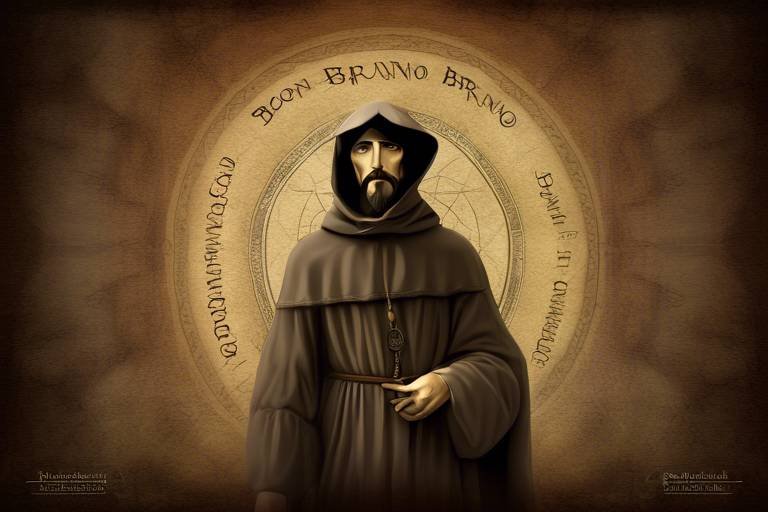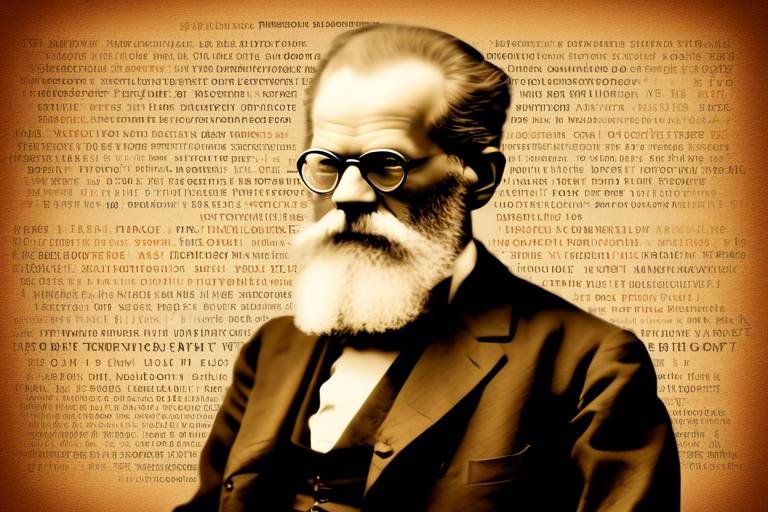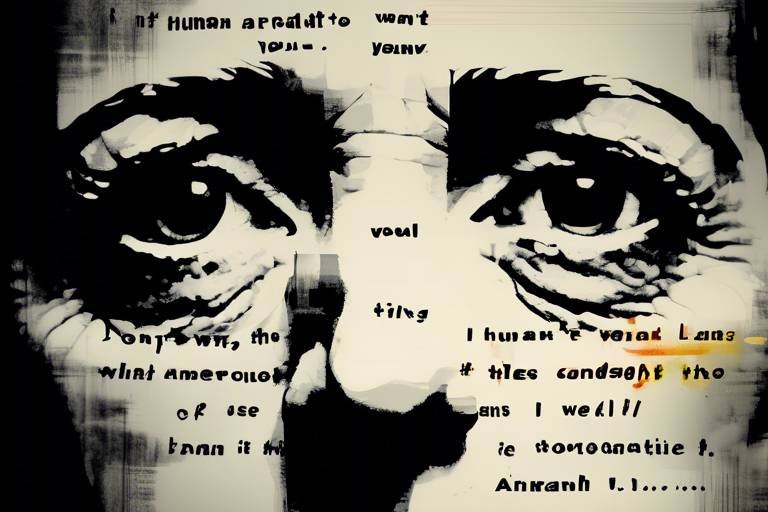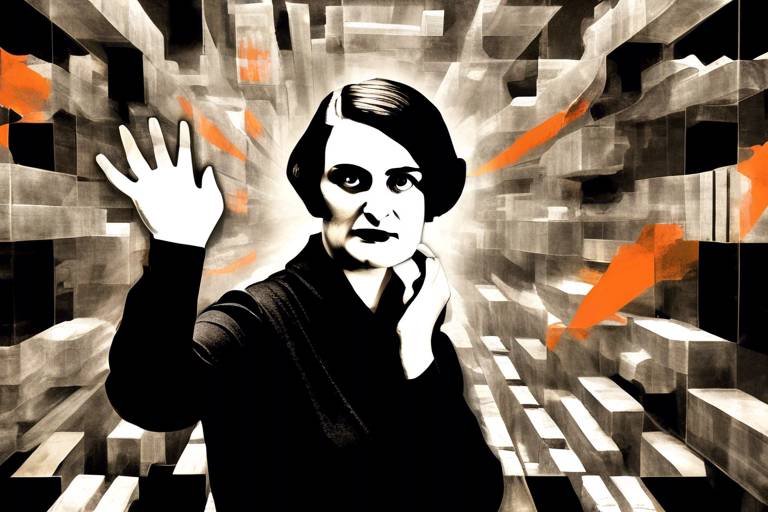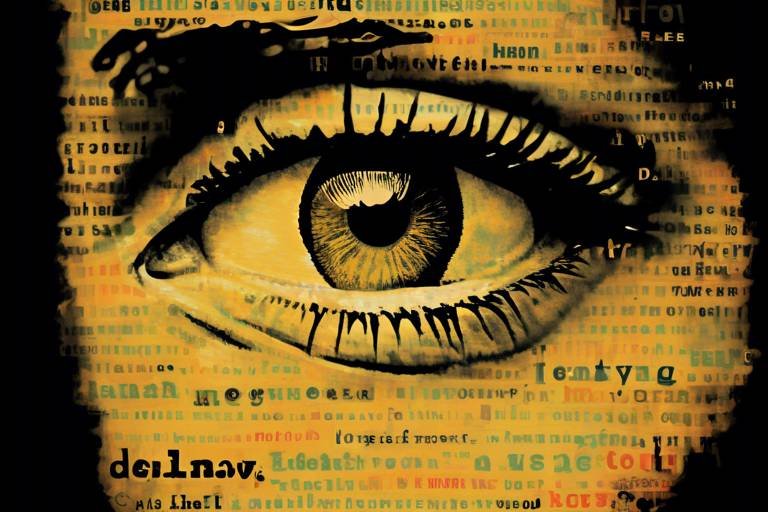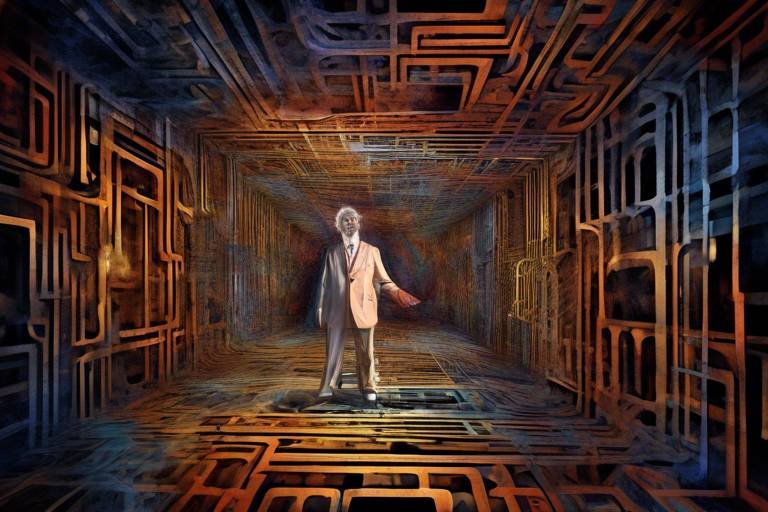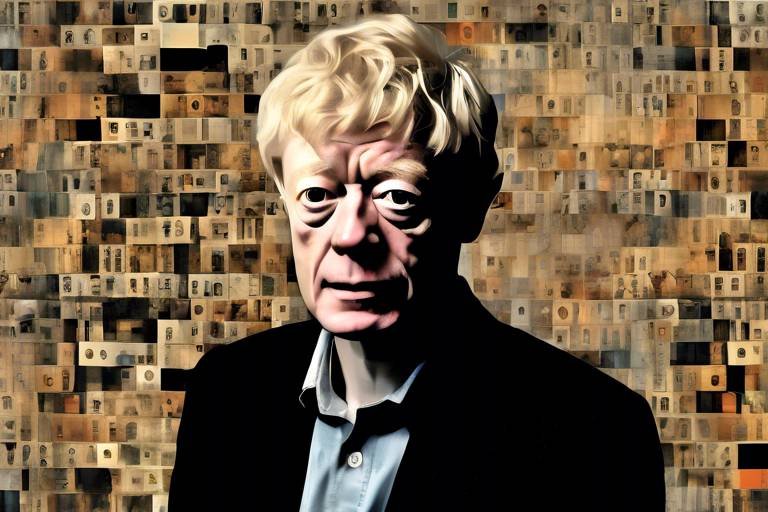Humanism and Renaissance - The Philosophy of Giordano Bruno
Giordano Bruno, a name that resonates with the echoes of the Renaissance, stands as a beacon of humanistic thought and a fervent advocate for the pursuit of knowledge beyond the constraints of dogma. During a time when the world was awakening from the slumber of the Middle Ages, Bruno's philosophy emerged as a radical departure from the norm, championing the idea that human beings are not merely subjects of divine will but active participants in the cosmos. His ideas were not just revolutionary; they were a clarion call for a new way of thinking that emphasized individual potential and the intrinsic value of human experience.
At the heart of Bruno's philosophy lies the concept of humanism, which flourished during the Renaissance, encouraging a return to classical learning and the exploration of human capabilities. Humanism celebrated the achievements of human beings and sought to understand the world through reason, science, and art rather than through the lens of religious doctrine. Bruno embodied these ideals, promoting the notion that humanity could unlock the mysteries of the universe through inquiry and intellectual rigor.
Bruno's cosmological views were particularly groundbreaking. He posited that the universe is infinite, filled with countless worlds and possibilities, challenging the geocentric model that dominated the thinking of his time. This belief not only expanded the scope of human understanding but also placed humanity in a broader context within the universe, suggesting that we are part of a vast, interconnected cosmos rather than isolated beings. Such ideas were not merely philosophical musings; they had profound implications for how people viewed their place in the world and their relationship with the divine.
However, embracing such radical ideas came at a cost. Bruno's unwavering commitment to his beliefs put him at odds with the Catholic Church, leading to a dramatic conflict that would ultimately define his legacy. His trial and subsequent execution highlighted the tension between science and religion, a struggle that continues to resonate today. Bruno's life and work serve as a reminder of the importance of free thought and the courage it takes to challenge prevailing norms.
In exploring the impact of Giordano Bruno, we uncover not just a philosopher but a visionary whose ideas continue to inspire and provoke thought. His legacy is a testament to the enduring power of humanism and the relentless pursuit of knowledge, urging us to question, explore, and embrace the infinite possibilities of our existence.
- Who was Giordano Bruno? Giordano Bruno was an Italian philosopher, mathematician, and poet who played a significant role in the Renaissance, promoting ideas of an infinite universe and human potential.
- What is humanism? Humanism is a philosophical and ethical stance that emphasizes the value and agency of human beings, focusing on the importance of reason, ethics, and justice.
- How did Bruno's ideas conflict with the Church? Bruno's ideas challenged the Church's teachings, particularly his beliefs about an infinite universe and the nature of God, leading to his persecution and execution.
- What is Bruno's legacy? Bruno's legacy lies in his contributions to philosophy and science, as well as his role in advocating for free thought and the pursuit of knowledge beyond religious constraints.

The Essence of Humanism
Humanism, a philosophy that blossomed during the Renaissance, fundamentally reshaped the way individuals perceived their existence and potential. It was like a breath of fresh air in a world that had been stifled by dogma and rigid hierarchies. At its core, humanism emphasizes the intrinsic value of human beings, advocating for the idea that individuals are capable of reason, creativity, and moral decision-making. This was a radical shift from the medieval focus on divine authority and the afterlife, placing the human experience at the forefront of philosophical inquiry.
Giordano Bruno was a quintessential figure of this movement, embodying the principles of humanism through his relentless quest for knowledge and understanding. He believed that humans were not merely subjects of fate but rather active participants in shaping their own destinies. This perspective encouraged a sense of agency and responsibility, urging individuals to seek their own truths and challenge established norms. The humanist mantra of "ad fontes," or "to the sources," echoed throughout Bruno's work as he sought to return to the original texts of ancient philosophers and thinkers, drawing inspiration from their insights while also critiquing their limitations.
One of the most compelling aspects of humanism is its focus on individual potential. Humanists posited that every person has the capacity for greatness, creativity, and intellectual achievement. This belief was not just theoretical; it manifested in various fields, including art, science, and literature. Artists like Leonardo da Vinci and Michelangelo, who were influenced by humanist thought, pushed the boundaries of creativity, producing works that celebrated human beauty and experience. In science, figures like Copernicus and Galileo began to question the geocentric model of the universe, paving the way for a more empirical approach to understanding the cosmos.
Moreover, humanism fostered a sense of community and shared experience. It encouraged individuals to engage with one another, share ideas, and collaborate in the pursuit of knowledge. The establishment of universities and libraries during this period served as hubs for intellectual exchange, allowing thinkers like Bruno to connect with others who shared their thirst for knowledge. This spirit of collaboration was essential in cultivating a vibrant intellectual landscape that would give rise to the modern world.
In summary, the essence of humanism lies in its celebration of human dignity, potential, and the pursuit of knowledge. It challenged individuals to think critically, embrace creativity, and engage with the world around them. Giordano Bruno's life and work exemplified these ideals, as he sought to expand the boundaries of human understanding and inspire others to do the same. His legacy continues to resonate today, reminding us of the power of human thought and the importance of questioning the status quo.

Giordano Bruno's Life and Background
Giordano Bruno, born in 1548 in Nola, Italy, was not just a philosopher; he was a revolutionary thinker whose ideas would echo through the corridors of time. His life story is a tapestry woven with threads of curiosity, conflict, and a relentless pursuit of knowledge. Growing up in a world teetering on the brink of change, Bruno was influenced by the vibrant intellectual atmosphere of the Renaissance, a period that celebrated human potential and inquiry. His early education, steeped in the teachings of the Dominicans, ignited his passion for philosophy and the natural sciences, setting the stage for a lifelong quest to challenge the status quo.
Bruno's formative years were marked by an insatiable thirst for knowledge. He delved into the works of ancient philosophers such as Plato and Aristotle, but it was the Neoplatonism of thinkers like Plotinus that particularly captivated him. This philosophical approach emphasized the importance of the individual soul and its connection to the cosmos, a theme that would resonate throughout Bruno's later works. His studies were not confined to the cloistered walls of academia; rather, Bruno traveled extensively across Italy and beyond, absorbing diverse ideas and perspectives that would enrich his own philosophical framework.
His interactions with other thinkers of the Renaissance were pivotal in shaping his worldview. Bruno engaged with notable contemporaries, including Galileo and Copernicus, whose revolutionary ideas about the heliocentric model of the universe sparked Bruno's imagination. He was fascinated by the notion of an infinite universe, which contradicted the traditional geocentric views upheld by the Church. This intellectual camaraderie with other scholars fueled his belief that the universe was not only vast but also filled with potential for human exploration and understanding.
Bruno's educational journey took him to various cities, including Venice, Paris, and London, where he immersed himself in the rich tapestry of human thought. Each location offered unique insights, from the vibrant discussions in Italian universities to the bustling intellectual salons of France. His experiences abroad expanded his horizons and deepened his commitment to the principles of humanism, which emphasized the importance of individual experience and empirical observation. Bruno's travels also exposed him to the burgeoning scientific methods that were beginning to challenge traditional philosophical doctrines.
In summary, Giordano Bruno's life and background were characterized by a profound engagement with the ideas of his time, a relentless pursuit of knowledge, and a willingness to confront the prevailing beliefs of the Church. His early influences, interactions with contemporary thinkers, and extensive studies laid the groundwork for his revolutionary ideas about the cosmos and humanity's place within it. Bruno's journey was not merely a personal quest; it was a monumental step towards the evolution of thought that would shape the future of philosophy and science.
- Who was Giordano Bruno?
Giordano Bruno was an Italian philosopher, mathematician, and cosmologist known for his revolutionary ideas about the universe during the Renaissance. - What were the main influences on Bruno's philosophy?
His philosophy was heavily influenced by Neoplatonism, the works of Plato and Aristotle, and the emerging scientific ideas of his contemporaries. - What was Bruno's view on the universe?
Bruno believed in an infinite universe, challenging the traditional geocentric views held by the Catholic Church at the time. - Why did Bruno come into conflict with the Church?
His radical ideas about the universe and humanism directly contradicted the Church's teachings, leading to his eventual persecution.
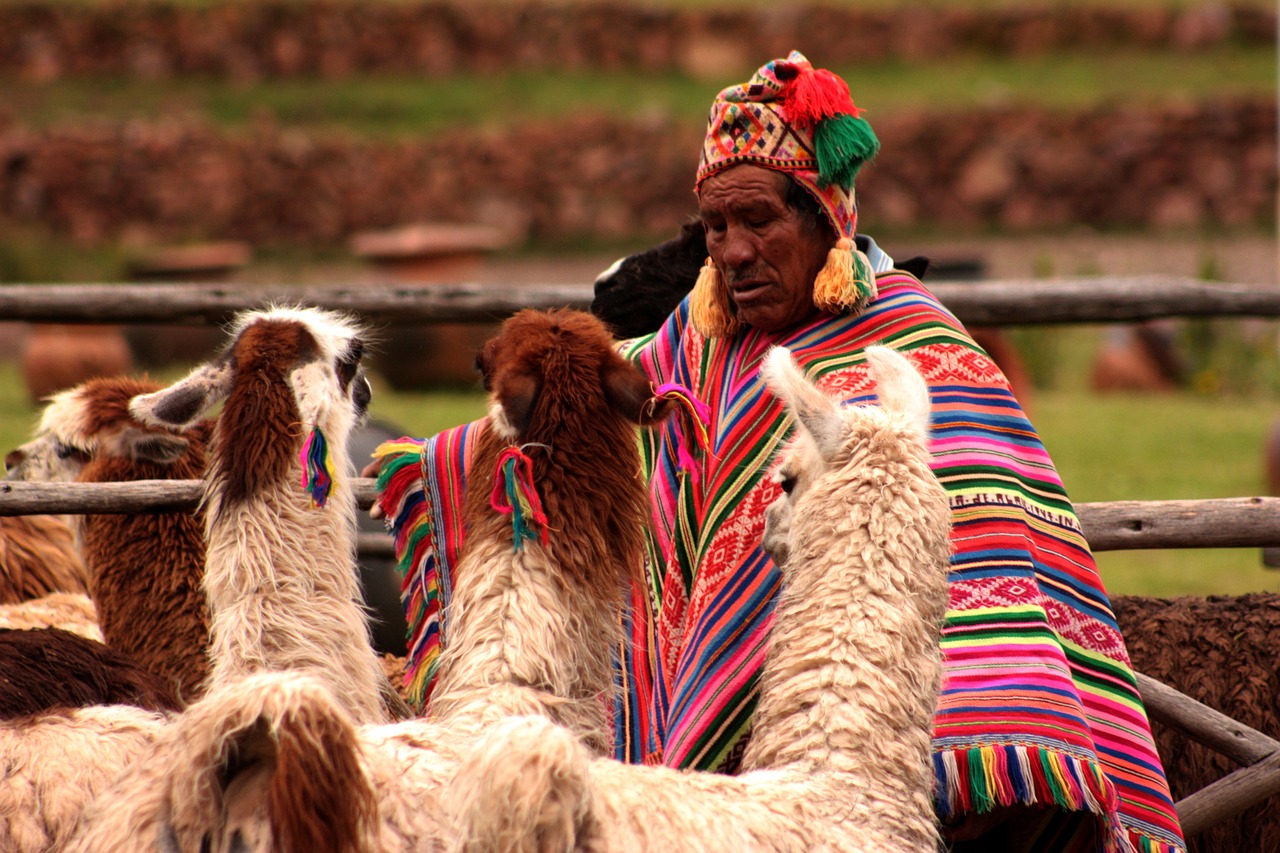
Bruno's Early Influences
Giordano Bruno's early influences were as diverse as they were profound, shaping his philosophical outlook and paving the way for his revolutionary ideas. Born in 1548 in Nola, Italy, Bruno was immersed in a rich intellectual environment that fostered critical thinking and curiosity. One of the most significant influences on Bruno was Neoplatonism, a philosophical system that sought to reconcile Plato's ideas with mystical and religious elements. This framework encouraged Bruno to explore the relationship between the physical world and the divine, leading him to ponder the nature of existence beyond mere materialism.
Moreover, the works of earlier philosophers, such as Aristotle and Plotinus, provided a foundation upon which Bruno built his own theories. While Aristotle's empirical approach to science was influential, Bruno was not afraid to challenge some of his ideas, particularly those concerning the cosmos. He believed in an infinite universe, a stark contrast to the finite, geocentric model that dominated the thinking of his contemporaries.
Bruno's philosophical journey was also deeply enriched by his exposure to the Renaissance humanist movement. This movement emphasized the importance of human experience and rational thought, encouraging individuals to seek knowledge through observation and inquiry. As Bruno delved into the works of humanist thinkers, he became increasingly fascinated by the potential of the human mind to grasp universal truths. The idea that humans could shape their destiny and understand the cosmos was a radical departure from the prevailing religious doctrines of his time.
Additionally, Bruno's time spent in various academic circles exposed him to a plethora of ideas. He engaged with the writings of Copernicus, whose heliocentric theory ignited Bruno's imagination, prompting him to consider a universe that was not only vast but also dynamic. This interaction with contemporary thinkers and their groundbreaking ideas played a crucial role in shaping his own cosmological views.
In summary, the early influences on Giordano Bruno were a tapestry of philosophical, scientific, and humanist thought. His exposure to Neoplatonism, the works of earlier philosophers, and the burgeoning humanist movement all contributed to his unique worldview. These influences not only shaped his ideas but also set the stage for the conflicts he would later face with established institutions, particularly the Catholic Church.
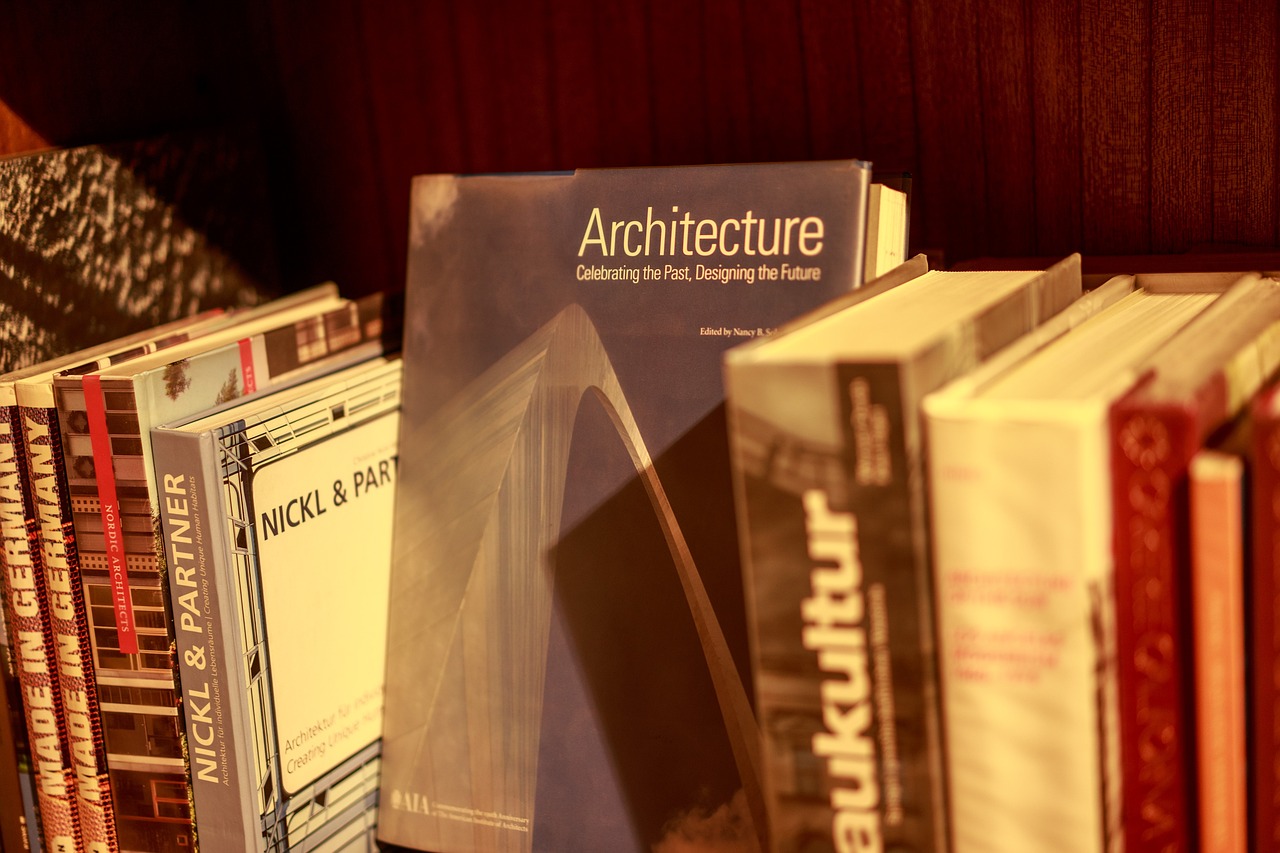
Interactions with Other Thinkers
Giordano Bruno was not just a solitary philosopher; he was a vibrant part of the intellectual tapestry of the Renaissance. His interactions with other thinkers of his time played a crucial role in shaping his ideas and philosophies. Imagine a bustling café in Florence, where brilliant minds gathered to exchange thoughts, challenge each other, and ignite the flames of creativity. This was the milieu in which Bruno thrived. He engaged with a variety of scholars, scientists, and philosophers, each contributing to his evolving worldview.
One of the most significant influences on Bruno was Niccolò Machiavelli, whose political theories and emphasis on human agency resonated deeply with him. Machiavelli's pragmatic approach to governance and his understanding of the complexities of human nature inspired Bruno to explore the potential of humanity beyond the constraints of traditional dogma. Bruno admired Machiavelli's courage to question established norms, which encouraged him to delve into more radical ideas about the universe and humanity's place within it.
Another pivotal figure in Bruno's intellectual journey was Giovanni Pico della Mirandola, a fellow humanist whose works celebrated the dignity and potential of human beings. Pico's famous Oration on the Dignity of Man laid the groundwork for the humanist movement, emphasizing that humans have the capacity to shape their own destinies. Bruno took these ideas further, arguing that not only do humans have the power to influence their lives, but they also play a vital role in the cosmos. This cosmic perspective set Bruno apart from many of his contemporaries, positioning him as a revolutionary thinker.
Moreover, Bruno's exchanges with scientists like Galileo Galilei and Copernicus were instrumental in his cosmological theories. While Copernicus introduced the heliocentric model, suggesting that the Earth revolved around the Sun, Bruno expanded this idea into a more radical vision of an infinite universe filled with countless stars and planets, each possibly hosting life. His discussions with Galileo, who was also questioning the geocentric view of the universe, further solidified his belief in an expansive cosmos. Bruno's bold assertions about the universe being infinite and populated with life challenged the very foundations of Aristotelian cosmology and the Church's teachings.
Bruno's interactions were not limited to direct conversations. He was also deeply influenced by the works of earlier thinkers such as Plato and Aristotle, whose ideas he reinterpreted in light of his own experiences and observations. For instance, while Plato's theory of forms suggested a realm of perfect ideas, Bruno argued for a more dynamic and interconnected universe, where forms were not static but ever-evolving. This reinterpretation of classical philosophy demonstrated Bruno's ability to engage critically with established thought, blending it with his unique insights.
In summary, Giordano Bruno's interactions with a diverse array of thinkers were pivotal in shaping his philosophical outlook. Through spirited debates and the exchange of ideas, he was able to forge a path that not only challenged the status quo but also laid the groundwork for future generations of thinkers. His legacy is a testament to the power of collaboration and dialogue in the pursuit of knowledge.
- Who was Giordano Bruno? Giordano Bruno was an Italian philosopher, mathematician, and cosmologist who played a significant role in the Renaissance humanist movement.
- What were Bruno's main philosophical ideas? Bruno is known for his belief in an infinite universe, the potential of humanity, and the importance of individual thought and free will.
- How did Bruno's ideas conflict with the Church? Bruno's radical cosmological views and emphasis on human potential directly challenged the dogma of the Catholic Church, leading to his persecution.
- What was the outcome of Bruno's trial? Bruno was tried by the Inquisition and ultimately executed for heresy due to his unyielding beliefs.
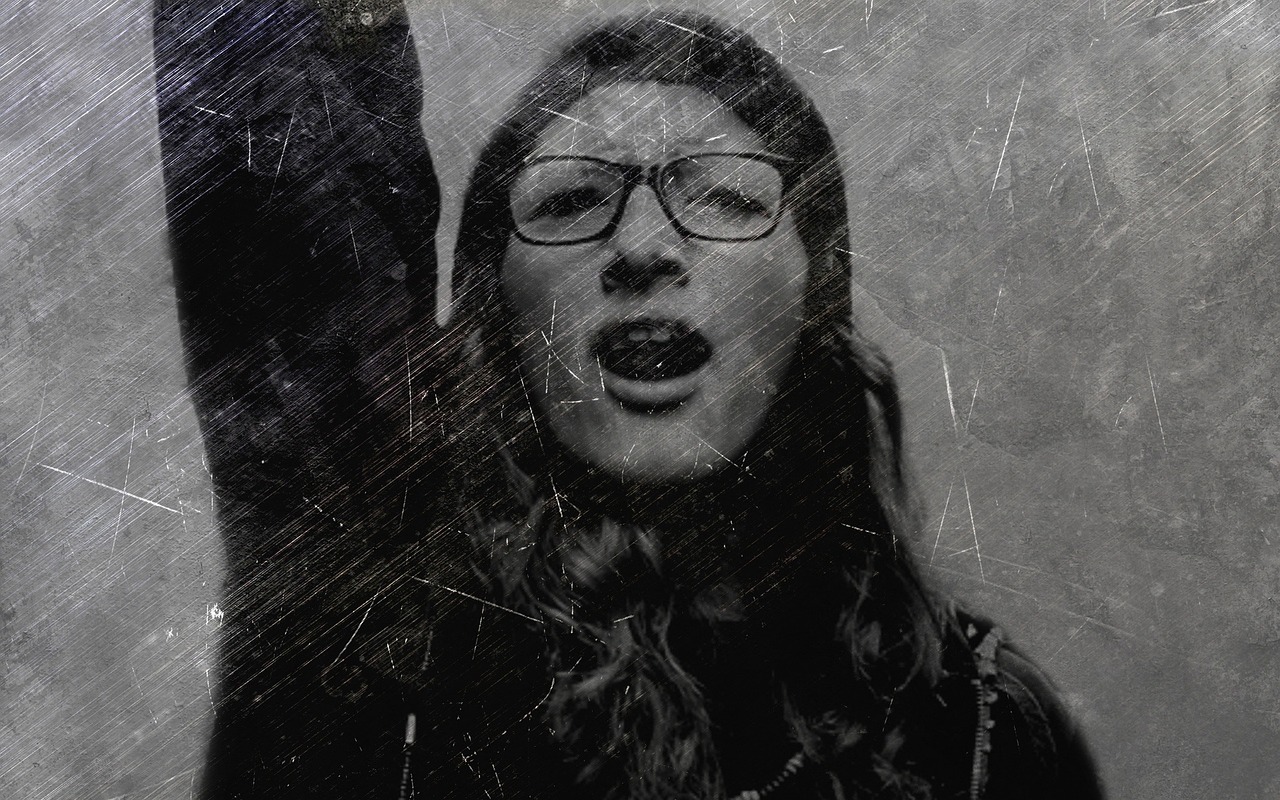
Bruno's Studies in Italy and Abroad
Giordano Bruno’s academic journey was nothing short of a thrilling adventure, traversing through the vibrant landscapes of Italy and beyond. Born in 1548 in Nola, Italy, Bruno's early education began at the local monastery, where he was introduced to the rich tapestry of philosophy and theology. However, it was not long before he sought broader horizons, eager to delve deeper into the mysteries of existence and the cosmos.
After leaving Nola, Bruno studied in Naples, a city buzzing with intellectual fervor. Here, he encountered the works of Neoplatonists and Aristotelian thinkers, which profoundly influenced his philosophical outlook. He quickly became enamored with the idea of an infinite universe, challenging the established geocentric views of his time. Bruno’s studies in Naples were pivotal, as they laid the groundwork for his later revolutionary ideas.
Bruno’s intellectual thirst led him to travel extensively across Europe. He spent time in various cities, including:
- Paris - where he interacted with leading thinkers and engaged in debates that broadened his perspective.
- London - where he explored the burgeoning scientific ideas and the early stirrings of what would later become the Scientific Revolution.
- Geneva - where he confronted the Protestant Reformation's implications on human thought.
These travels were not just about acquiring knowledge; they were about immersing himself in the cultural and intellectual currents of the time. Bruno was a true cosmopolitan, absorbing ideas from diverse traditions and synthesizing them into his unique worldview. His studies in the various universities and salons of Europe allowed him to connect with other intellectuals, sharing and refining his thoughts on humanism and cosmology.
During his time abroad, Bruno also became acquainted with the works of Copernicus, which ignited his passion for astronomy and the infinite. He began to articulate his thoughts on the universe, positing that it was not just heliocentric but infinite, filled with countless worlds. This radical notion was a reflection of his studies and the vibrant intellectual exchanges he experienced during his travels.
In summary, Bruno's studies in Italy and abroad were crucial in shaping his philosophical ideas. His relentless pursuit of knowledge, combined with his interactions with other thinkers, fueled his belief in the boundless potential of human thought. As he navigated through the complexities of the Renaissance intellectual landscape, he emerged as a beacon of humanist philosophy, forever changing the way we perceive our place in the universe.

Bruno's Cosmological Views
Giordano Bruno was not just a philosopher; he was a visionary who dared to challenge the conventional understanding of the universe during the Renaissance. His cosmological views were revolutionary, proposing that the universe is infinite and filled with countless worlds, each potentially harboring life. This was a radical departure from the geocentric model espoused by the Church, which placed Earth at the center of the universe. Bruno's ideas can be likened to a vast ocean, where each wave represents a different world, all interconnected yet distinct, illustrating the boundless nature of existence.
One of Bruno's most significant contributions was his belief in the plurality of worlds. He argued that the stars we see in the night sky are not just distant suns but could also be home to other civilizations. Imagine looking up at the stars and realizing that each twinkle might be a beacon of life, just like ours. This perspective not only expanded the horizon of human thought but also suggested that humanity was not the pinnacle of creation, as the Church had taught, but merely one of many forms of life in a vast cosmos.
Bruno's cosmology was deeply intertwined with his understanding of God. He viewed the universe as a divine manifestation, where God was immanent in all things. This pantheistic view suggested that the divine essence permeated the cosmos, making every part of the universe sacred. For Bruno, the universe was alive, a dynamic entity that reflected the infinite nature of God. He stated, “The universe is a living being,” which encapsulates his belief that everything within it is interconnected and animated by a divine spirit.
His ideas were not just philosophical musings; they had profound implications for science and religion. Bruno's advocacy for an infinite universe challenged the very foundations of the Church’s teachings. He posited that the universe had no boundaries, which meant that there was no ultimate center—neither Earth nor humanity. This was a daring assertion at a time when the Church held significant power over intellectual discourse. Bruno's vision can be summarized in a few key points:
- Infinite Universe: The universe is boundless and contains countless worlds.
- Plurality of Worlds: Each star could potentially host life, challenging the anthropocentric view.
- Pantheism: God is present in all aspects of the universe, making it sacred.
Bruno’s cosmological views were not merely theoretical; they laid the groundwork for future scientific inquiry. His ideas predated and arguably influenced later thinkers like Galileo and Newton, who would further explore the cosmos. Bruno's courage to think beyond the accepted norms of his time exemplifies the spirit of the Renaissance—a period characterized by a thirst for knowledge and a willingness to challenge the status quo.
In conclusion, Giordano Bruno's cosmological views were a beacon of enlightenment in a dark age of dogma. His belief in an infinite universe and the interconnectedness of all things not only redefined humanity's place in the cosmos but also ignited a flame of curiosity that continues to inspire scientific exploration today. Bruno's legacy reminds us that true understanding often requires us to look beyond the horizon and embrace the vast unknown.
- What is Giordano Bruno known for? Bruno is known for his cosmological theories that proposed an infinite universe and the plurality of worlds, challenging traditional views held by the Church.
- How did Bruno's views conflict with the Church? Bruno's ideas contradicted the Church's geocentric model and its teachings about humanity's central place in the universe, leading to his persecution.
- What impact did Bruno have on later scientific thought? His revolutionary ideas paved the way for future scientists and philosophers, encouraging a more expansive view of the cosmos.

The Conflict with the Church
The life of Giordano Bruno was a vivid tapestry woven with threads of intellectual brilliance and unyielding courage. However, this tapestry was not without its dark patches, as his radical ideas brought him into direct conflict with the powerful institution of the Catholic Church. During the Renaissance, the Church held immense authority over not only religious matters but also the intellectual landscape of the time. Bruno’s philosophy, which embraced a boundless universe and the potential of human reason, was like a spark in a powder keg, threatening to ignite a revolution in thought.
Bruno's belief in an infinite universe, where countless worlds existed, directly challenged the Church's geocentric view, which placed Earth at the center of the cosmos. This notion was not merely a scientific disagreement; it was a profound challenge to the Church's theological framework. Bruno argued that if the universe was infinite, then God's creation was far more expansive than previously imagined, which undermined the Church's authority and its interpretation of scripture. His ideas suggested that humans were not the focal point of existence, but rather a small part of a much larger cosmic reality.
As Bruno's ideas gained traction, they attracted the attention of the Church, which viewed his teachings as heretical. The Church's doctrine was rooted in a literal interpretation of the Bible, and any deviation from this was seen as a direct threat. Bruno’s insistence on the freedom of thought and the pursuit of knowledge ignited a fierce backlash. In a society where dissent was often met with severe consequences, Bruno's audacity to question established beliefs put him on a collision course with the ecclesiastical authorities.
In 1592, Bruno was arrested by the Inquisition, marking the beginning of a harrowing trial that would last nearly seven years. The proceedings were not just about Bruno's ideas; they were a reflection of the broader struggle between emerging scientific thought and traditional religious dogma. The Church, fearing the loss of its influence, sought to crush any intellectual movement that threatened its power. During his trial, Bruno remained steadfast in his beliefs, refusing to recant despite the pressure to conform.
| Key Events in Bruno's Conflict with the Church | Year |
|---|---|
| Bruno's Arrest | 1592 |
| Start of Trial | 1593 |
| Bruno's Sentencing | 1600 |
Ultimately, Bruno was found guilty of heresy and was sentenced to death. On February 17, 1600, he was executed in Rome, a martyr for the cause of free thought and intellectual inquiry. His death sent ripples through the intellectual community, serving as a stark reminder of the dangers faced by those who dared to challenge the status quo. The conflict between Bruno and the Church epitomizes the struggle between tradition and progress, a theme that resonates throughout history.
Today, Bruno is celebrated not only for his contributions to philosophy and cosmology but also for his unwavering commitment to the pursuit of truth. His legacy serves as a beacon for those who seek to challenge established norms and expand the boundaries of human understanding. In a world where questions often lead to uncomfortable answers, Bruno's life is a poignant reminder of the courage it takes to stand up for one's beliefs, even in the face of overwhelming opposition.
- What were Giordano Bruno's main philosophical beliefs?
Bruno believed in an infinite universe, the potential for multiple worlds, and the importance of human reason and free thought. - Why did Bruno conflict with the Catholic Church?
His ideas challenged the Church's teachings on cosmology and theology, leading to accusations of heresy. - What was the outcome of Bruno's trial?
Bruno was found guilty of heresy and executed by the Church in 1600. - How has Bruno's legacy influenced modern thought?
Bruno's commitment to free thought and scientific inquiry has inspired generations of thinkers and remains relevant in discussions about the relationship between science and religion.

Bruno's Trial and Sentencing
Giordano Bruno's trial is not just a tale of courtroom drama; it is a gripping saga that encapsulates the fierce struggle between science and religion during the Renaissance. As Bruno's ideas began to gain traction, they also attracted the ire of the Catholic Church, which viewed his radical thoughts as a direct challenge to its authority. In 1592, he was arrested in Venice, and what followed was a protracted trial that would ultimately seal his fate. The proceedings were marked by a series of interrogations that sought to break his spirit and force him to recant his beliefs.
During the trial, Bruno faced numerous charges, including heresy and blasphemy. The Church was particularly concerned about his views on the infinite universe, which contradicted the geocentric model that placed Earth at the center of the cosmos. His belief that the stars were suns, each potentially hosting their own planets and life forms, was revolutionary and unsettling for the ecclesiastical authorities of the time. The trial lasted for over seven years, with Bruno steadfastly refusing to renounce his ideas. His unwavering commitment to his philosophy ultimately led to a grim conclusion.
On February 17, 1600, Bruno was sentenced to death. The manner of his execution was both brutal and symbolic, serving as a stark reminder of the consequences of challenging the established order. He was tied to a stake and burned alive in the Campo de' Fiori in Rome. This tragic event not only marked the end of Bruno's life but also highlighted the perilous position of free thinkers in an era dominated by dogma. His trial and subsequent execution became a powerful symbol of the fight for intellectual freedom and the right to question prevailing beliefs.
The implications of Bruno's trial extended far beyond his death. It sparked a conversation about the limits of free thought and the role of the Church in governing intellectual discourse. Many thinkers who followed Bruno were inspired by his courage and resilience, further fueling the flames of the Enlightenment. The legacy of his trial serves as a poignant reminder that the pursuit of knowledge often comes with great personal cost.
In retrospect, Bruno's trial can be viewed as a pivotal moment in the history of philosophy and science. It raised essential questions about the nature of truth and the importance of intellectual exploration. As we reflect on this dark chapter, we must remember the sacrifices made by those who dared to challenge the status quo and advocate for a more profound understanding of our universe.
- What were the main charges against Giordano Bruno?
Bruno was charged with heresy, blasphemy, and promoting ideas contrary to the teachings of the Catholic Church. - How long did Bruno's trial last?
Bruno's trial lasted for over seven years, from his arrest in 1592 until his execution in 1600. - What was the outcome of Bruno's trial?
Bruno was found guilty and sentenced to death by burning at the stake. - What impact did Bruno's trial have on future thinkers?
Bruno's trial inspired many future thinkers and contributed to the larger movement advocating for free thought and intellectual freedom.

The Legacy of Giordano Bruno
Giordano Bruno's legacy is nothing short of monumental. His ideas not only challenged the prevailing doctrines of his time but also paved the way for a new era of thought that embraced freedom of inquiry and the expansion of human knowledge. After his execution in 1600, Bruno became a symbol of the struggle against dogmatism and censorship, inspiring countless thinkers and movements throughout history. His vision of an infinite universe, where countless worlds exist beyond our own, altered the course of scientific exploration and philosophical debate.
One of the most significant aspects of Bruno's legacy is the way he intertwined philosophy and science. He was among the first to advocate for a universe that was not geocentric but rather infinite and populated with numerous celestial bodies. This radical idea laid the groundwork for future astronomers like Galileo and Kepler, who would further develop the heliocentric model of the solar system. Bruno's insistence on observation and empirical evidence resonated with the emerging scientific method, making him a precursor to modern scientific thought.
Bruno’s influence extended beyond science; his ideas contributed significantly to the Humanist movement. He emphasized the importance of individual potential and the intrinsic value of human life, which echoed through the works of later philosophers such as Descartes and Spinoza. His writings encouraged a more personal approach to philosophy, inspiring individuals to seek knowledge and understanding outside the confines of established religious teachings.
Moreover, Bruno's legacy is celebrated in various cultural and intellectual circles. His life and ideas have been the subject of numerous books, films, and academic discussions. For instance, the Giordano Bruno Memorial in Rome stands as a testament to his enduring impact, reminding us of the price he paid for his beliefs. In contemporary times, the themes of his philosophy resonate with movements advocating for freedom of thought and secularism, emphasizing the ongoing relevance of his work in today’s society.
In summary, Giordano Bruno's legacy is a rich tapestry of philosophical inquiry, scientific exploration, and the relentless pursuit of truth. His life serves as a reminder of the importance of questioning established norms and the value of intellectual freedom. As we reflect on his contributions, we recognize that the essence of his philosophy continues to inspire new generations to explore the vastness of human potential and the mysteries of the universe.
- What were Giordano Bruno's main contributions? Bruno contributed significantly to the concepts of an infinite universe and the importance of empirical evidence in philosophy and science.
- Why was Bruno executed? He was executed by the Catholic Church due to his radical ideas that contradicted established religious doctrines.
- How did Bruno influence modern science? His ideas about the universe being infinite and populated with other worlds laid the groundwork for later scientific advancements in astronomy.
- What is the significance of Bruno in the context of humanism? Bruno emphasized the value of individual potential and the importance of human experience, which are core principles of humanism.
Frequently Asked Questions
- What is humanism, and how did it influence Giordano Bruno?
Humanism is a philosophical stance that emphasizes the value and agency of human beings, focusing on individual potential and critical thinking. During the Renaissance, humanism inspired thinkers like Giordano Bruno to explore ideas beyond traditional religious doctrines, fostering a culture of inquiry and intellectual freedom.
- What were some key influences on Giordano Bruno's philosophy?
Bruno was significantly influenced by Neoplatonism and the works of earlier philosophers, such as Aristotle and Plato. These influences shaped his views on the cosmos, human existence, and the nature of reality, leading him to propose revolutionary ideas about an infinite universe and the interconnectedness of all things.
- How did Bruno's interactions with other thinkers impact his work?
Bruno engaged with various contemporary thinkers, including Galileo and Copernicus, which enriched his philosophical outlook. These interactions helped him to challenge established norms and encouraged him to develop his unique perspectives on cosmology and humanism.
- What were Giordano Bruno's cosmological views?
Bruno believed in an infinite universe, proposing that stars are suns with their own planets. This radical idea contradicted the geocentric model of the universe and suggested that humanity is just one part of a vast, interconnected cosmos, fundamentally altering our understanding of our place in the universe.
- What led to Bruno's conflict with the Catholic Church?
Bruno's radical ideas, particularly his views on the universe and the nature of God, clashed with the teachings of the Catholic Church. His insistence on free thought and the pursuit of knowledge ultimately led to his persecution, as the Church sought to suppress ideas that threatened its authority.
- What happened during Giordano Bruno's trial?
Bruno's trial was a significant event that highlighted the tension between science and religion. Accused of heresy, he faced a lengthy trial during which he defended his beliefs. Ultimately, he was sentenced to death, marking a pivotal moment in the history of free thought and the struggle against dogmatism.
- What is the legacy of Giordano Bruno today?
Bruno's ideas have had a lasting impact on philosophy, science, and the humanist movement. His commitment to intellectual freedom and inquiry continues to inspire modern thinkers and serves as a reminder of the importance of questioning established beliefs and pursuing knowledge without fear.

